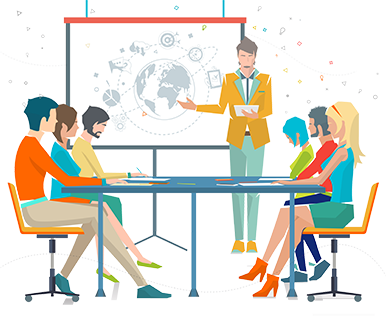

Liberal Arts education is spread across several fields which are crucial for an individual to develop logical and critical thinking; to understand issues which are vital for the modern and future human societies and the world, to apply their mind to solve several social, economic, political, and environmental issues and problems.
The scope of liberal arts far exceeds the diversity and exposure that you may not always find in specialized education.
A Bachelor's program in Liberal Arts and Sciences from Era University Lucknow is an interdisciplinary approach to learning offers the students the freedom and opportunity to study and explore a variety of subject for science and humanities. The program empowers students to make an informed decision about the subject they want to specialize in for their undergraduate degree. Choosing subjects from different fields helps them to build a broad base of knowledge so it is more than just a degree. Provides the opportunity to pursue career-oriented subjects along with subjects of interest and the students Acquire New-Age Problem Solving Skills. Interdisciplinary approach inculcates the orientation necessary to solve multi-dimensional global issues.
3 Year Multidisciplinary Programe
|
Year 1 & 2 (Semester 1-4) |
Year 3 (Semester 5-6) |
|
Introduction to contemporary civilization (1) and (2) |
Noble Laureates (1) & (2) |
|
B.A.-Literature, Political Science, Economics, Sociology, Psychology, Philosophy |
1. Elective in core subjects, including some integrated subjects |
Live Projects (Integrated) |
Trans-disciplinary projects, Environmental and Ecology projects |
Capstone projects |
C. Creative Courses |
Theatre workshop, Creative writing, Film making, Performing art appreciation, Visual language and grammar, Music/ Dance/ Design/Pottery/Fine Arts |
--- |
D.1. Life Skills |
Critical thinking. Academic writing, Research methodology (Qualitative and Quantitative) |
Strategic communication and Problem solving, Principles of management, Basics of law, Leadership |
D.2. Life Skills |
Visit to (police station, Court room, Vidhan Sabha), Nutrition and wellness project, Simulate united Nations, Discover India |
Preparation and secondary research for international immersion, International immersion at Barbados campus, Internship in Industry |
D.3.Life Skills (Noncredit) |
Workshop on transition from school to college life, basic communication skills, gardening, boot camp. Role and identity lab. |
|
CRITICAL THINKING
Tools of Critical Thinking, Logic and Argument Building, Evaluation of information, Problem Solving and Decision Making etc.
FOUNDATIONAL THOUGHTS
Introduction to Classical Thoughts • Neo- Classical Ideas • Social Self and Society • Contemporary and Current Ideas • Contemporary Human Adaptability
INTRODUCTION TO ECONOMICS
Scope & Significance • Introduction to Microeconomics: Basic Concepts &Terminology • Theory of Consumer Behaviour • Theory of Production • Market Structures • Macro Analysis.
INTRODUCTION TO LITERATURE
Introduction to Literature as a window to the times • Poetry: How to decode a poem? Introduction to different forms of poetry (Sonnets, Dramatic) • Short Stories: How to decode short stories? • Drama: To introduce fundamentals of playwriting and drama in performance • New Experiments in Writing Literature
INTRODUCTION TO PSYCHOLOGY
Evolution, Scope, Meaning, Nature, Psychology and Other Disciplines • Professions in Psychology and Branches of Psychology • The Basis of Human Behaviour • Cognitive Process, Outside class hours for demonstration of Methods in Psychology, Cognitive Process, Memory-Process
INTRODUCTION TO SOCIOLOGY
What’, ‘Why’ and ‘How’, Development of Course, Concepts in Sociology, Culture, Civilization and State • Overall Sustainable Development • Sociological Perspective, Sociological Research Methods
POLITICAL SCIENCE-I (AN INTRODUCTION TO POLITICAL SCIENCE)
Understanding Politics: What, Why and How • Games Politician Play • Political Science: Components, Tasks and Controversies • The Quest for the Good • Liberal Democracy, Democratic Socialism and Communism
THEATRE WORKSHOP
Introduction to Theatre: Why theatre? Theatre as an art form, Origins of Theatre, Theatre as Performance • Nature of audiences • Types of theatre spaces – proscenium, thrust, arena • Tools of Theatre: Illusion of reality, fantasy, flashbacks, anachronisms, symbols, metaphors • Types of Plays: Tragedy, Comedy, Mixed: Heroic, Epic, Tragic-comedy • The Craft of Acting: Voice; Body; Speech; Movement and Improvisation, Acting Styles, Naturalistic; Realistic; Hyper-real; Physical; Farcical and Melodramatic • Stage Craft Scenic design: Geography of the stage – acting area, entries and exits, wings, backstage, technical, audience seating, hidden areas onstage, 9 parts of the stage, Plot areas for a play onstage • Use of Props, Realistic • Metaphoric •Symbolic, Costumes: What role do costumes play, Different approaches to costumes
SCIENCE STREAM
Basic Human Anatomy • Biotechnology and Human Welfare • Computer Science • Fundamentals of Mathematics • Introduction to Environmental Science • Nutritional Biochemistry
Basic Human Anatomy And Applied Anatomy: General & Systemic Anatomy: Introduction to Anatomical Terms, Cardio Vascular System, Respiratory System, Digestive System, Nervous System
Regional anatomy (upper extremity): Osteology, Anthology, Pectoral Region, Scapular Region, Axilla, Shoulder Girdle and Arm, Elbow and Forearm, Wrist and Hand
Regional anatomy (lower extremity): Osteology, Arthrology, Pelvic & Gluteal Region, Hip & Thigh Region, Knee & Leg, Ankle & Foot
Regional anatomy (trunk, head & neck):Trunk, Osteology, Arthrology, myology and their relations of: Vertebral Column Thoracic cage Abdomen Pelvis, Head & Neck Musculoskeletal and neurovascular features of neck and cranium Cranial nerves
BIOTECHNOLOGY AND HUMAN WELFARE
FUNDAMENTALS OF COMPUTER
Introduction to Computer, Computer Memory, Operating System: Computer Software, Computer Languages, Multimedia, Introduction to MS Office, Network Internet, Email, Hospital Management System
FUNDAMENTALS OF MATHEMATICS
FOOD AND NUTRITION: NUTRITIONAL BIOCHEMISTRY
Concept of Food Supplements and Fortification: Types and Roles, Introduction to food adulterations and precautions, Concept of specific health conditions and prescribed diet, Introduction to regulatory components of nutritional health, Preparing diet charts based on gender, age and occupation, Food adulteration tests
INTRODUCTION TO ENVIRONMENTAL SCIENCE
This degree program offers multi-faceted career possibilities.
Once a student completes his/her liberal arts graduate program successfully they are eligible for placement in the field of relationship management, marketing, consultancy, HR, e- commerce, banking, consultancy and client servicing etc. journalism, teaching, advertising, writing, research and public relations are some other interesting fields that are open to liberal arts/science graduates.